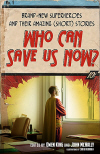Who Can Save Us Now?
Who Can Save Us Now? is a collection of twenty-two short stories that each provide a new take on superhero lore, twisting and turning genre conventions on their head in the hopes of providing a new experience within the framework of the short story. Editors Owen King and John McNally use the book’s introduction to reflect on the difference between our world and the one that provided the more black-and-white conflicts of the Golden Age of comic books, setting the stage for tales of new superheroes “whose amazing abilities reflect and address our strange and confusing new conditions,” specifically the more modern terrors of “suicide bombers, dwindling oil reserves, global warming, and an international community in complete disrepair.”
Who Can Save Us Now? is a collection of twenty-two short stories that each provide a new take on superhero lore, twisting and turning genre conventions on their head in the hopes of providing a new experience within the framework of the short story. Editors Owen King and John McNally use the book’s introduction to reflect on the difference between our world and the one that provided the more black-and-white conflicts of the Golden Age of comic books, setting the stage for tales of new superheroes “whose amazing abilities reflect and address our strange and confusing new conditions,” specifically the more modern terrors of “suicide bombers, dwindling oil reserves, global warming, and an international community in complete disrepair.”
That’s a lofty goal, but not completely out of reach of these stories. The best succeed on both a literary level and a comic book level, creating characters with compelling arcs facilitated by their superpowers but not dependent on them. One of the best, Kelly Braffet’s “Bad Karma Girl Wins at Bingo,” tells about a girl named Cassandra Mulcahey whose terrible luck at everything is offset by the good luck of those around her. As Cassandra learns the limits of her karmic powers, she doesn’t create a costume or take on an alter-ego (the name “Bad Karma Girl” exists only in the title). What she does do – and this is the heroic part – is learn to stop feeling bad for herself and to use her inverse luck to the benefit of others. After she stops a bar from being burglarized, she begins to wonder:
If she hadn’t been there, the bartender would be dead and Stanko would be a murderer. Even the detective had said the outcome was amazing. She’d said she had no control over the things that happened around her; but there was something nagging at her now . . . All she’d ended up with was a broken wrist. Which seemed like not much, all things considered. Slipping in a puddle, losing your grip on a baseball bat: Those were small things too.
Had she made them happen? Could she make them happen consciously, when she wanted to? Because if she could – if she could the ramifications of that were potentially huge.
Cassandra’s thoughts are the purest essence of the superhero origin, that moment where a person with unusual gifts understands that they have the ability to help others, even at great personal cost: Superman trapping his extraordinary self in the poor guise of Clark Kent to save his adopted world, Batman throwing away his fortune and possibly his life to protect a city that will never thank him – and now, Cassandra Mulcahey, who takes on the world’s mishaps so that others might have a bit of good luck.
Other highlights include Elizabeth Crane’s “Nate Pinckney-Alderson, Superhero,” Stephanie Harrell’s “Girl Reporter,” and Michael Czyzniejewski’s “When the Heroes Came to Town,” plus stories by excellent literary writers like Scott Snyder, Jim Shepard, George Singleton, and Tom Bissell. Jennifer Weiner is perhaps the biggest “genre” writer in the collection, her chick-lit background giving her superhero story a plot-level success that occasionally eludes some of the more literary writers included here.
The weaknesses of the collection are slight and likely come from the premise of the book itself. Few of these stories have been previously published, and most were presumably written expressly for this collection. This has led to a number of stories where the major draw seems to be how different of a superhero the writer can dream up, such as John McNally’s hero The Silverfish in “Remains of the Night” or the titular characters in Sam Weller’s origin story “The Quick Stop 5.” Luckily, these stories still generally succeed, and certainly their similar natures might be less obvious if they were to be read alone, outside of this collection.
Who Can Save Us Now? is a timely collection, published during what might be the peak of the superhero craze that has swelled over the last few years. In a year where all the biggest summer movies are based on comic books, it’s good to see literary fiction getting in on the fun, offering up this compendium of new heroes to the mix. As kids, we all had a favorite superhero, the one who personified the mythic person we wished we could be. In the four hundred plus pages of this anthology, we’re once again invited to find new heroes to identify with, the kind who just might make the adult versions of ourselves want to look deep inside and find something more there, some part of ourselves that’s finally ready to strap on a cape and help save the world.





